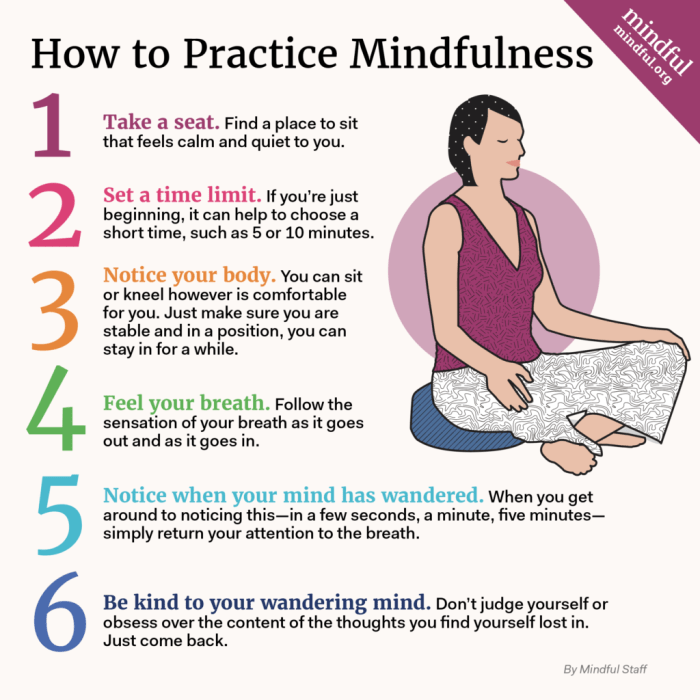
How to achieve mental clarity through mindfulness practices delves into various techniques and strategies that can help individuals enhance their mental well-being and focus. This engaging topic explores the benefits of mindfulness and how it can be integrated into daily life for improved cognitive function and emotional regulation.
Throughout this discussion, we will explore the concept of mindfulness, its application in daily routines, mindful eating practices, stress management techniques, emotional regulation exercises, and its impact on cognitive function.
Mindfulness Practices for Mental Clarity
Mindfulness is the practice of being fully present and aware of your thoughts, emotions, and sensations in the present moment without judgment. It involves focusing on the here and now, rather than dwelling on the past or worrying about the future.Some benefits of mindfulness practices for achieving mental clarity include reduced stress and anxiety, improved focus and concentration, enhanced self-awareness, and better emotional regulation.
By being more mindful, you can cultivate a sense of calmness and clarity in your mind.
Mindfulness Techniques
- Meditation: Meditation involves sitting quietly and focusing on your breath or a particular object to help calm the mind and increase awareness. It can help reduce stress and improve mental clarity.
- Deep Breathing: Deep breathing exercises involve taking slow, deep breaths to activate the body’s relaxation response and reduce stress levels. This can help clear the mind and improve focus.
- Body Scans: Body scans involve paying attention to different parts of your body, noticing any sensations or tension, and then consciously relaxing those areas. This practice can help increase body awareness and promote relaxation.
Integrating Mindfulness into Daily Routine
Incorporating mindfulness practices into your daily routine can have a significant impact on your mental clarity and overall well-being. Consistency is key when it comes to mindfulness, as it allows you to reap the full benefits of these practices. Creating a peaceful environment for mindfulness practice can help you stay focused and present in the moment.
Ways to Incorporate Mindfulness Practices into Daily Life
- Start your day with a short mindfulness meditation to set a positive tone for the day.
- Practice mindfulness while doing daily activities such as eating, walking, or even washing dishes. Focus on the sensations and experiences in the present moment.
- Take short mindfulness breaks throughout the day to pause, breathe, and recenter yourself.
The Importance of Consistency in Mindfulness Routines, How to achieve mental clarity through mindfulness practices
Consistency in mindfulness practices helps train your mind to be more present and focused. When you make mindfulness a regular part of your routine, you are better able to manage stress, improve concentration, and enhance your overall mental clarity.
Tips for Creating a Peaceful Environment for Mindfulness Practice
- Find a quiet and comfortable space where you can practice without distractions.
- Set a specific time each day for your mindfulness practice to establish a routine.
- Use calming elements such as candles, soft music, or essential oils to create a soothing atmosphere.
Mindful Eating for Mental Clarity
Practicing mindful eating can significantly contribute to achieving mental clarity by helping individuals focus on the present moment and develop a healthier relationship with food.
The Practice of Mindful Eating
Mindful eating involves being fully present while consuming food, savoring each bite, and paying attention to the flavors, textures, and sensations experienced during the meal. This practice encourages individuals to eat slowly and mindfully, without distractions such as television, phones, or computers.
- Avoid multitasking while eating to fully concentrate on the act of nourishing your body.
- Chew food thoroughly and appreciate the taste and aroma of each bite.
- Practice gratitude for the food on your plate and the nourishment it provides for your body.
- Listen to your body’s hunger and fullness cues to eat in moderation and avoid overeating.
Food Choices and Mental Well-being
There is a strong connection between food choices and mental well-being. Consuming a balanced diet rich in nutrients can positively impact mood, cognitive function, and overall mental health. By choosing whole, unprocessed foods and practicing mindful eating, individuals can support their mental clarity and emotional well-being.
Mindfulness and Stress Management

Mindfulness practices can be highly effective in managing stress levels and promoting overall well-being. By incorporating mindfulness techniques into your daily routine, you can reduce anxiety, increase relaxation, and improve mental clarity.
Techniques for Using Mindfulness to Reduce Anxiety and Promote Relaxation
- Practice deep breathing exercises to calm the mind and body.
- Engage in mindful meditation to focus on the present moment and let go of racing thoughts.
- Use body scan techniques to release tension and stress from different parts of the body.
- Acknowledge and accept your emotions without judgment to cultivate a sense of calmness.
Impact of Stress on Mental Clarity and How Mindfulness Can Counteract It
Stress can cloud our thinking, impair decision-making, and hinder cognitive function. Mindfulness helps us stay grounded, present, and focused, allowing us to navigate challenges with clarity and resilience.
Mindfulness and Emotional Regulation
When it comes to emotional regulation, mindfulness plays a crucial role in helping individuals manage their feelings and reactions effectively. By cultivating present moment awareness and non-judgmental acceptance, mindfulness practices can provide a powerful tool for navigating the complexities of our emotions.
Benefits of Mindfulness in Emotional Regulation
Practicing mindfulness can help individuals regulate their emotions by:
- Increasing self-awareness: Mindfulness allows individuals to observe their emotions without immediately reacting to them, providing a deeper understanding of their emotional patterns and triggers.
- Promoting self-compassion: By approaching emotions with kindness and acceptance, individuals can learn to be more gentle and understanding towards themselves, fostering emotional resilience.
- Enhancing emotional flexibility: Mindfulness practices help individuals develop the ability to respond to emotions in a more adaptive and constructive manner, rather than reacting impulsively.
Mindfulness Exercises for Emotional Balance
- Body Scan: A practice where individuals scan their body from head to toe, paying attention to any physical sensations or emotions that arise without judgment.
- Loving-Kindness Meditation: This practice involves sending well-wishes and compassion to oneself and others, promoting positive emotions and empathy.
- R.A.I.N Technique: Recognize, Accept, Investigate, and Non-identification. This method helps individuals navigate difficult emotions by acknowledging, exploring, and letting go of them with mindfulness.
Mindfulness and Cognitive Function: How To Achieve Mental Clarity Through Mindfulness Practices

Mindfulness practices have been shown to have a positive impact on cognitive function and mental clarity. By training the mind to focus on the present moment without judgment, individuals can experience improvements in various cognitive abilities.
Effects of Mindfulness on Cognitive Function
- Research has indicated that mindfulness practices can enhance concentration and focus by reducing distractions and improving attention span.
- Regular mindfulness meditation has been linked to improved working memory, which is essential for tasks that require holding and manipulating information in the mind.
- Mindfulness techniques help individuals become more aware of their thoughts and emotions, leading to better cognitive control and decision-making abilities.
Research Findings on Mindfulness and Cognitive Performance
- A study published in the journal Psychological Science found that participants who underwent mindfulness training showed significant improvements in cognitive flexibility and problem-solving skills compared to a control group.
- Another study published in the Journal of Cognitive Enhancement reported that mindfulness meditation can enhance cognitive function by promoting neuroplasticity and increasing connectivity in brain regions associated with attention and memory.
- Research has also shown that mindfulness practices can help reduce cognitive decline in older adults and improve overall cognitive function as we age.
Tips for Enhancing Memory and Cognitive Performance with Mindfulness
- Practice mindfulness meditation regularly to improve attention and focus.
- Avoid multitasking and try to focus on one task at a time to enhance working memory.
- Engage in mindful breathing exercises to calm the mind and improve cognitive control.
- Incorporate mindfulness into daily activities such as mindful walking or eating to boost cognitive function throughout the day.
Final Conclusion
By incorporating mindfulness practices into your daily life, you can experience improved mental clarity, emotional balance, and cognitive function. Embrace mindfulness as a powerful tool for enhancing your overall well-being and leading a more fulfilling life.
FAQ Compilation
How can mindfulness practices improve cognitive function?
Mindfulness practices have been shown to enhance concentration, focus, and memory, leading to improved cognitive performance.
What are some examples of mindfulness techniques for emotional regulation?
Practices such as deep breathing, body scans, and meditation can help individuals navigate their emotions effectively and promote emotional balance.
How does mindful eating contribute to mental clarity?
Mindful eating involves savoring each bite, eating without distractions, and making conscious food choices, all of which contribute to improved mental clarity and well-being.





